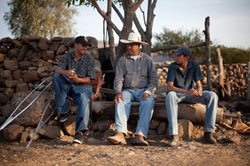
In this NPR story, Mark Krikorian, the executive director of the Center for Immigration Studies, believes that Jose Antonio Vargas should go back to the Philippines. His thinking is that, although Jose was a child when he arrived in the US, he was an older child of 12 whose identity had already been formed as a Filipino. In Krikorian's mind, the movement to grant amnesty for immigrants who arrived here illegally as children would therefore not really apply to Jose. Krikorian also pointed out a difference between someone who is undocumented and someone who has used illegal documents (Jose falls in the latter category). What do you think? Where is Jose's "home"?
On another note, I read some interesting news about the changes that are being noted in numbers of immigrants, undocumented or documented, from Mexico. NY Times writer Damien Cave reports that the number of people coming to the US from Mexico has significantly decreased in the last few years. He cites many different causes for the change -- which are interconnected in complex ways. First, the birth rate and average number of children per family has significantly dropped. What might that mean? Parents in families with fewer children are better able to financially support their children, teens, and young adults through hard times. In addition, there are more educational and occupational opportunities in Mexico, and living conditions have improved - AND, related in part to the economic situation in the US, the difference between wages that could be earned in the US and those that could be earned in Mexico has shrunk. Remember David Bacon's story about "the right to stay home"? Sounds like more families are able to do that. Two other factors at play - democracy has strengthened in Mexico in the last decade and the processes required to legally visit or move to the US have been simplified. Check out Cave's online article for details, and also for some cool interactive features.
It is a complex world we live in, eh?
Just started teaching a new class - Psychology and the Environment. We are about 20 students strong - about 2/3 master's counseling psych students and about 1/3 landscape architecture students. I know very little about landscape architecture as a profession but how neat is this? The American Society of Landscape Architects has the following statement in the preamble to its ethical code:
The policies established by the Board of Trustees relative to environmental stewardship, quality of life, and professional affairs are summarized in the ASLA Code of Environmental Ethics. Members should make every effort to enhance, respect, and restore the life-sustaining integrity of the landscape and seek environmentally positive, financially sound, and sustainable solutions to land use, development, and management opportunities.
I am looking forward to learning more, so stay tuned. Next up, I think - all about sustainability.


 RSS Feed
RSS Feed
